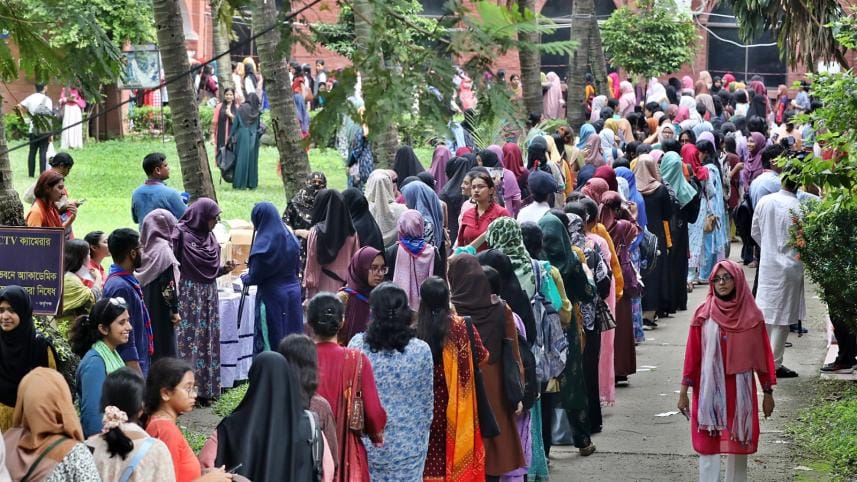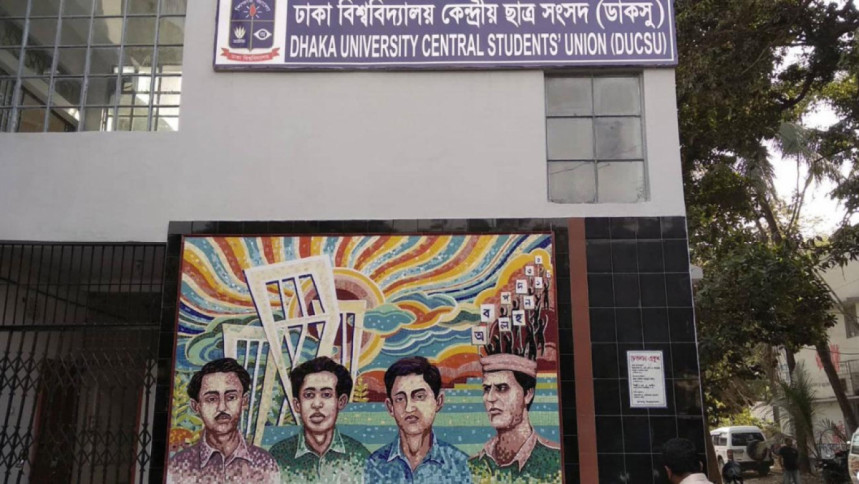When campus politics takes the centre stage

The landslide victory of the Islami Chhatrashibir-backed panel in the Dhaka University Central Students' Union (Ducsu) election on Tuesday came as a shock to many. (The results of Jucsu polls at Jahangirnagar University, held on Thursday, was pending as of 7:30pm Friday.) Ever since the transition to parliamentary democracy in 1991, our political establishment has gotten used to a musical chair with the Awami League and BNP as the main contenders in national politics. Politics in the public universities reflected those in power; student unions were confined overtly to debates over dining hall menus, dormitory allocations, and cultural activities, and covertly to construction commissions and controlling rented properties in the vicinity. The disproportionate attention given to student polls exposes the political vacuum created by the country's eroded electoral culture. The media's hunger for symbolic contests catapulted student elections to the centre stage, as if they were national referendums.
Ironically, while the hype pitches student unions as "proxy parliaments," the unions' constitutions limit them to nothing more than a welfare body under the vice-chancellors' authority. Five student representatives of the unions will join the university senates for a year or until their successors step in, provided they have a valid student status. In a changed political landscape, students are likely to seek more stakes in the governance of the universities. Even so, the coverage of these student elections cannot be justified.
The only justification is that these elections are test cases for the interim government, which has promised a just transition to the democratic process. The shrinking space for competitive electoral politics caused by successive national elections being rigged, suppressed, and boycotted has made citizens lose faith in the ballot box. Such a vacuum allowed campus elections as a rare space where voters found agency. The campaigns looked like some rituals to revive democracy from its deathbed. The spectacles created by newspapers, podcasts, and social media platforms satisfied our longing for democracy.
The lopsided attention given to DU poses another Orwellian riddle: why is one institution more of an institution than the other? Given DU's image in the national imagination as a site of every political movement, such emphasis is understandable. Then again, it highlights a problem for democracy, where too much weight is placed on one institution to mirror the pulse of an entire nation.
We often perceive campuses as miniature representations of the country. However, universities, with their educated demographics, may not fully represent the actual voters. But the momentum created during the elections may impact the decision-making process. That is why Shibir went for a tactical rebranding and scripted the performance to present themselves as a new finalist in the political game. They started their campaign by promoting the decoupling of student politics from national bases. They demanded a ban on party-leaning student politics and the declaration of hall committees by students' organisations. They aimed to achieve two objectives: to dissociate themselves from the stigma associated with their parent body, Jamaat-e-Islami, and to destabilise Jatiotabadi Chatradal's (JCD) return to campus after a long absence. Shibir opted for both a new name and a new optic, while JCD was caught off guard with its hands buried in the cookie jar of old politics. They were presented as the main actors in the ongoing culture of extortion, usurpation, vandalism, and underhanded dealings.
For those of us who have seen the violent phases of Shibir activism in the 80s and 90s, this is a surprising twist. To broaden their reach, they fielded a progressive female candidate and even a candidate from the Indigenous community. This strategic gesture portrays the organisation as an inclusive force.
What the progressive camps have failed to understand is that there is a cultural shift at the public universities. Since 2013, madrasa students have outperformed admission seekers from mainstream schools and colleges. Hijab, for example, is a dress of religious choice for many. By targeting hijab, and other religious markers, the mainstream parties appeared to be a mirror image of the old Chhatra League, which persecuted anything that did not pass their version of secularism.
Another smart move of Shibir included the way they avoided invoking Jamaat's role in the Liberation War. It skillfully shifted the focus from guilt to victimhood. Their opponents focused on branding them as criminals of history, while they concocted a narrative of being martyrs of the present, especially in the July uprising.
It is time that other student bodies learnt from the student-centric initiatives. JCD took an oath to abolish bullying in the public room, which has become a nightmare for all incoming students. Yet it was somewhat too late. The recruitment strategy of Shibir involved mentoring students for admission and providing them with subsidies, off-campus jobs, tutoring services, medical and legal aid, and basic utilities, such as water filters in halls. The source of the funding remains a significant and unresolved question. However, while mainstream wings flexed their muscles, Shibir focused on providing welfare.
JCD, in contrast, was crippled by its parent organisation's indecision. Unsure of whether to contest campus polls before securing a national electoral breakthrough, they delayed, dithered, and ultimately joined under pressure. Students read this hesitation as weakness—a reflection of a party more obsessed with national power games than student welfare. Swing voters shifted to Shibir not out of ideological alignment but to punish JCD and send a message to the BNP.
The greatest loser in this battle, however, is the National Citizen Party (NCP). Given their close ties to the government, their decline is truly tragic. Yet, amid this hype, one must confront the sobering fact: Ducsu's or Jucsu's constitutional powers are limited. Under the 1973 act, the VCs are the ex-officio presidents of these bodies. The very functions over which national parties battle for symbolic control are not legally within the mandate of student unions. The hype, amplified by social media algorithms, manufactured the illusion of a mandate. What Shibir won was not a parliament but a stage with the whole world watching.
Such a rise of religion-based student forces can reverberate beyond campus walls. It can pose a fundamental question: are the youth genuinely shifting towards faith-based politics, or merely fleeing the rot of mainstream student wings? This is where the election is likely to have a broader national impact. The Shibir-backed panel's Ducsu win matters, but not in the way headlines suggest. It signals the exhaustion with mainstream party proxies, the power of disciplined rebranding, and the political hunger created by the absence of credible national elections. It shows how a campus can become a stage when the national theatre remains closed.
Dr Shamsad Mortuza is professor of English at Dhaka University.
Views expressed in this article are the author's own.
Follow The Daily Star Opinion on Facebook for the latest opinions, commentaries and analyses by experts and professionals. To contribute your article or letter to The Daily Star Opinion, see our guidelines for submission.




 For all latest news, follow The Daily Star's Google News channel.
For all latest news, follow The Daily Star's Google News channel. 

Comments